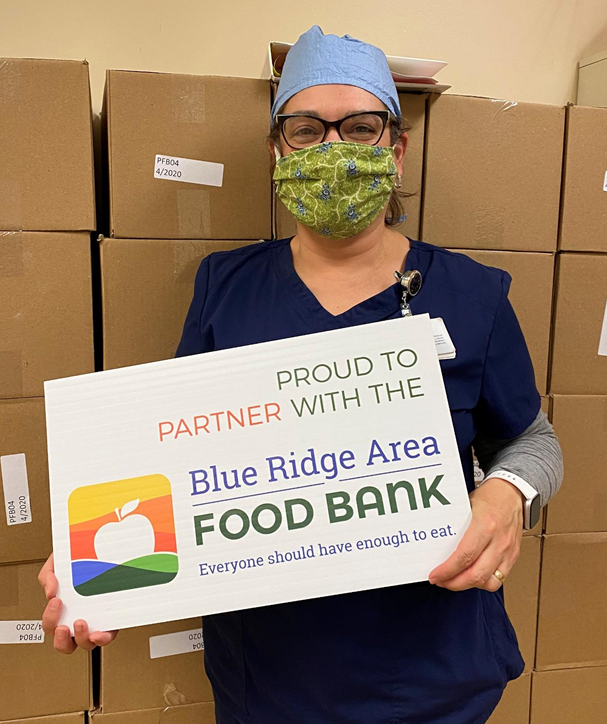Written By: Maria Bowman, MPH, Director of Health Initiatives
The first Nutrition Security and Health Summit was held in Richmond in April. Organized by the Federation of Virginia Food Banks, it was a truly incredible gathering of food bank staff, healthcare partners, funders, and community leaders. We were all there to explore together innovative, collaborative ways to advance health equity via nutrition security.
Food insecurity is a major problem in the Commonwealth. Almost 10% of Virginians do not have enough nutritious food to eat.
I presented the Blue Ridge Area Food Bank’s current and future work related to health and nutrition during a panel session. The panel included Traci Simmons, Director of Health Systems Innovation at Feeding America, Barbara Smith, Vice President of Community Health at VCU Health, and myself.
Traci shared Feeding America’s perspective that partnership between food banks and healthcare is mutually beneficial and has great potential to impact and improve health equity.
Barbara used GIS mapping, health outcome and cost information, and food insecurity data to highlight the financial and health costs of food insecurity. She emphasized the power of food access partnerships like Food Pharmacy to improve health and save insurers and individuals significant amounts of money.

The Food Banks’ long-term commitment to health and nutrition
During my presentation, I shared that the Blue Ridge Area Food Bank has been deepening its focus on health and nutrition for the past 10 years in large and small ways. We have:
- implemented a tool called Nourish to help us source nutrient-dense foods
- increased our fresh produce supply by 96%
- hired staff with training in public health and dietetics
- created a Nutrition Policy, which restricts sugary beverages and high-sodium foods
- partnered with nutrition education experts
- developed relationships with healthcare partners
We have come a long way—and we feel like we’re just getting started! We see strategic, mission aligned, innovative partnerships with hospitals and clinics as a key priority in the years ahead.
My panel discussion highlighted our Food Pharmacy work, which is our in-clinic food pantry program. This program provides medically tailored foods to individuals who need it, onsite at their doctor’s appointment. This type of programming is relatively new across the country—and research is showing that it’s highly effective. When planned with patients and clinics or hospitals, Food Pharmacies reduce multiple barriers patients face in accessing nutritious food by leveraging the trusted and convenient healthcare setting.
The Food Pharmacy program started in March 2020 at the UVA Kidney Center in Charlottesville, largely thanks to two highly committed dietitians: Elaine McCall and Lesley McPhatter. Prior to the Food Pharmacy partnership, Elaine and Lesley provided sound dietary recommendations to their patients with kidney disease. However, they knew that for many patients, the advice they were giving was impossible to follow. Patients often wanted to eat a nutritious diet, but didn’t have transportation to the grocery store, were too tired to go shopping after the four-hour dialysis treatment, or didn’t have the money for fresh foods.
This led Elaine and Lesley to meet with Food Bank staff to explore the possibility of a Food Pharmacy at the Kidney Center. Their advocacy for the needs of their patients, openness to creative partnership, and desire to provide nutritious foods onsite brought this program to life. More than two years later, the program is still going strong at this first site. And, it has expanded to three more UVA Dialysis sites across the region as well as to Augusta Health (including 22 affiliated clinics) and the Blue Ridge Free Clinic in Harrisonburg.
Screening and referring patients for food insecurity
Clint Merritt, MD, is the chief clinical officer of population health and a practicing physician at Augusta Health in Fishersville. He is also a member of the Food Bank’s Board of Directors. Dr. Merritt presented on a separate panel discussion at the Summit. He shared that he sees value in screening patients for food insecurity, referring patients who are food insecure to food resources, and doing all of those through close food bank partnership.
Thanks to Dr. Merritt’s leadership, Augusta Health and the Food Bank are leaning into what we have learned from our Food Pharmacy partnership over the past year to improve food insecurity screening and referral processes. Our goal is to ensure an accurate, dignified, and convenient screening and referral process for patients. This would include providing nutritious, medically appropriate, and culturally familiar foods for those who need it.
A room full of problem solvers
Physicians, health insurance representatives, food bankers, social service providers, health consultants, and dietitians attended my panel discussion. When I asked them if they would consider themselves “problem solvers,” almost everyone in the room raised their hands enthusiastically.
Food insecurity is a solvable problem, but it’s going to take incredible collaboration and innovation to get community members the nutritious foods they need.
I’m grateful that we have a proven record of progress within health and nutrition, partners willing to dive into this work with us, and the support of our community via funds, talent, and insight to assist in this work. Together, we are creating new ways to increase nutrition security and health equity in Virginia. Thank you. Now, let’s get to work to make sure that everyone has enough nutritious food to eat!
To learn more: Explore Feeding America’s Hunger and Health website, including findings from research on Food as Medicine projects.
Hunger in the Blue Ridge: In our service area, 1 in 12 individuals experiences food insecurity. Read about our impact across the region.



